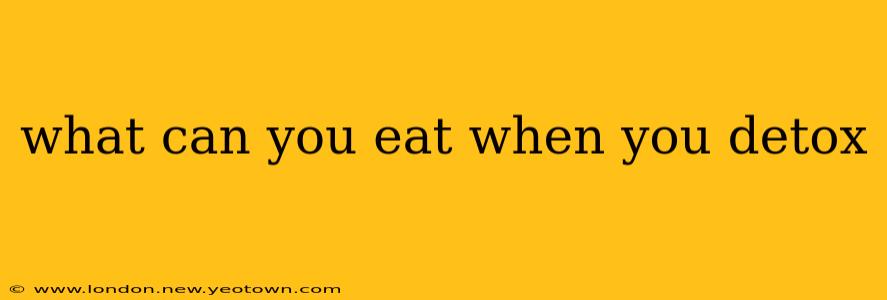What Can You Eat When You Detox? A Journey to Clean Eating
The idea of a "detox" is alluring. We picture ourselves shedding toxins, feeling lighter, and glowing with renewed health. But the truth is, our bodies already possess incredibly efficient detoxification systems – our liver, kidneys, and skin work tirelessly around the clock. So, what does a healthy "detox" truly entail? It's not about drastic cleanses or starvation diets, but rather focusing on nourishing your body with foods that support its natural cleansing processes. Think of it as a gentle reset, a shift towards cleaner eating rather than a radical overhaul.
This journey begins with understanding what foods best support your body's natural detoxification pathways. We'll explore some key food groups and address common questions surrounding detox diets.
What are the best foods to eat during a detox?
The foundation of a supportive diet focuses on whole, unprocessed foods. Imagine a vibrant plate bursting with color – that's the goal! This means loading up on:
-
Leafy Greens: Spinach, kale, and collard greens are nutritional powerhouses, packed with vitamins, minerals, and antioxidants that help neutralize harmful substances. Think of them as tiny little detox superheroes! I remember my grandmother always saying, “A handful of greens a day keeps the doctor away!” And there's real truth to that.
-
Cruciferous Vegetables: Broccoli, cauliflower, Brussels sprouts, and cabbage contain compounds that support liver function, the body's primary detox organ. Steaming or lightly roasting these brings out their best flavors and retains their valuable nutrients.
-
Fruits: Berries, especially blueberries and cranberries, are rich in antioxidants that combat free radical damage. Apples, pears, and citrus fruits also contribute to a healthy and vibrant detox diet.
-
Lean Protein: Chicken breast, fish (especially fatty fish like salmon), and beans provide essential amino acids for building and repairing tissues. Protein is crucial for overall health, helping your body function optimally during a detox.
-
Healthy Fats: Avocados, nuts, and seeds offer healthy fats that are essential for hormone production and nutrient absorption. These fats are not the enemy; they're important building blocks for a healthy body.
What should I avoid during a detox?
While focusing on what to eat is key, it's equally important to be mindful of what to avoid. This isn't about deprivation, but about making conscious choices. Minimize or eliminate:
-
Processed Foods: Packaged snacks, fast food, and overly processed meals often contain excessive amounts of unhealthy fats, sugar, and additives that can hinder your body's natural cleansing processes.
-
Refined Sugar: Sugar taxes your system and contributes to inflammation. Opt for naturally sweet options like fruits instead.
-
Alcohol: Alcohol puts a significant strain on your liver, the main organ responsible for detoxification. Limiting or avoiding alcohol during a detox supports its optimal function.
-
Caffeine: While a morning coffee might seem harmless, excessive caffeine can interfere with sleep and stress the body. Consider gradually reducing your intake.
-
Artificial Sweeteners: These can disrupt gut health and potentially interfere with detoxification pathways.
How much water should I drink during a detox?
Staying well-hydrated is crucial for any detox plan. Water helps flush out toxins and keeps your body running smoothly. Aim for at least eight glasses of water per day, more if you're exercising or sweating heavily.
What are some common misconceptions about detoxing?
Many detox products and diets promise miraculous results, but often lack scientific backing. Remember, your body is a highly efficient machine, and you don't need expensive cleanses or extreme diets to support its natural detoxification processes.
Can I do a detox if I have underlying health conditions?
If you have any underlying health conditions, consult your doctor before embarking on any detox plan. A healthcare professional can provide personalized advice and ensure the plan aligns with your specific needs and health status. They can guide you toward a safe and effective approach.
This isn't a quick fix; it's a shift towards a healthier lifestyle. By focusing on whole, unprocessed foods, staying hydrated, and minimizing harmful substances, you can support your body's natural detoxification processes and feel your best. Remember to listen to your body and adjust your plan as needed.

